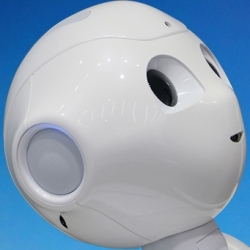
In certain Japanese stores, Pepper the robot greets customers with a giggle, a polite bow, and a short song. When Pepper debuts in the United States, sometime in the next year, he will be getting a personality adjustment and is more likely to offer a fist bump and a sarcastic comeback.
“In Japan, because they have a very cute-centric culture, Pepper is much more silly and cute,” says Alia Pyros, international communications manager at Aldebaran Robotics, a French company that developed the robot in collaboration with the Japanese corporation Softbank before Softbank acquired it outright. “In the U.S., we have this kind of C3-PO idea, where he’s kind of snarky and kind of smart.”
When I saw Pepper at Aldebaran’s offices in Boston, where the company is exploring ways to introduce the robot to the U.S. public, some of this stateside attitude was on display. After being introduced in the lobby, Pepper offered several times to high-five me. And when asked if it was a Terminator, Pepper said curtly: “Do I really have to answer that?”
Pepper is one of several robots hitting the market that are designed to entertain and assist people in store showrooms, in offices, and even at home. The falling cost of sensors, actuators, and computers has made it possible to build something capable of basic navigation, simple voice and image recognition, and even a little conversation. But all these robots are still quite rudimentary.
Pepper is more sophisticated than most of its competitors, some of which are immobile and limbless. The white plastic robot is a little over a meter tall, and it moves around on wheels embedded in a stable base. Its eyes change color as it listens and speaks, and it waves its humanoid arms in a surprisingly expressive way as it talks, which can make Pepper feel strangely engaging. Like other robots, Pepper is prone to mishearing or misinterpreting words and phrases, which can be confusing and frustrating. But it’s less error-prone than other bots I’ve seen.
At least for now, it’s not meant to take on very complex tasks: its hands and arms are incapable of fine manipulation. When asked if it can do the dishes, Pepper told me, “I suppose I could try, but I don’t think it would be a good idea; I’d rather just be a friend.” But at some point its capabilities could increase: Softbank has released an application programming interface for Pepper so that software developers can create custom capabilities. Aldebaran’s U.S. team has collaborated with researchers from IBM to give Pepper the ability to devise recipes, using the Watson platform.
Pepper costs around $2,000 in Japan and requires a monthly subscription fee for updates and maintenance.
